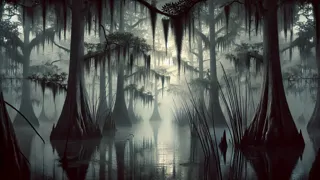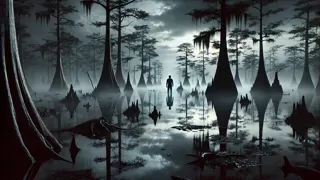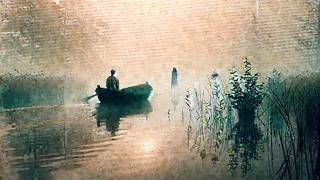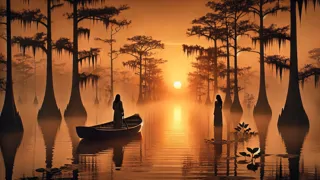Introduction
Elias Carver stood on the broad veranda of the old Carver estate as dusk draped its velvet cloak across the swamp beyond. The air was thick with the sweet, sour scent of cypress and decaying oak leaves, and the low groan of wind through Spanish moss sounded like an endless whisper. In the distance, fireflies danced over mirrored pools, and something else—something unnamed—stirred deep in the green heart of water and root. Since childhood, Elias had felt the tug of an unseen presence, a rumor of a beast haunting fog-cloaked channels and half-buried hollows. Noon conversations in the parlor drifted to that beast, though few cared to treat the legend as more than fanciful lore. But for Elias, it was a vow etched into his blood: he would remain vigilant, scanning the dark recesses until fate revealed itself in snarl or sigh. Even now, as the first stars pricked the sky, a shiver of anticipation ran down his spine, as if a final reckoning were drawing near. He adjusted the brim of his felt hat, inhaled the cool breath of evening, and resolved that tomorrow morning—when the sun’s first light fractured the mist—he would find the truth lumbering upon the water’s surface. Yet deep down, he sensed that some truths were more dangerous in the knowing.
Shadows Beneath the Cypress
Elias spent his earliest days wandering the narrow embankments that skirted the great Carver plantation, where ancient cypress trees draped their heavy limbs in curtains of Spanish moss. In the hush of dawn the air carried the scent of damp earth and rotting leaves, a perfume that whispered of secrets hidden beneath shallow water. Local hands spoke of shimmering shapes glimpsed between gnarled roots, half-seen at the water’s edge, but no one ever gave shape to those rumors beyond a shrug or a laugh. From the first moment Elias heard tales of the Beast—a creature of unknown power lurking in the swamp—his pulse quickened with anticipation and dread. He found himself drawn beyond the fences and down the muddy trails, chest tight with an unspoken vow to uncover that lurking presence. Each afternoon he scanned the reeds, imagining glowing eyes and low snarls beneath the green canopy. That obsession took root in his mind, forever tying his fate to the silent mysteries that lay beneath the cypress shade.

By his nineteenth summer, Elias had collected every fragment of local lore, from sailors’ weary whispers to merchant wives’ hushed confidences, building a private archive of dread. He tested shallow shafts with lanterns and rifles, but daylight brought nothing more than darting fish and the tangle of submerged roots. Friends chided him for chasing shadows, urging him to pursue study in distant cities, but he demurred, convinced that the true revelation awaited behind the veil of moss and water. Nights found him poring over journals by candlelight, maps spread across the mahogany desk as he plotted every bend of the creek and each moss-wrapped hollow. His tutor, Professor Hawthorne, spoke in measured tones of courage and curiosity, but Elias resisted both, perceiving in every flame and inked word a distraction from his singular purpose. In dreams he waded through black water, the beast’s hot breath just beyond his reach, and woke trembling, the echo of submerged growls still lingering in his bones. Those visions became as real to him as daylight, forging an unbreakable bond between the young man and the swamp’s unseen terror.
As years unfurled, the estate around him seemed to shrink in comparison to the vastness of his obsession. He watched slave cabins fall into disrepair and the river’s banks erode, but his gaze remained fixed on the shadowed channels. Even holidays passed without his attendance, for he could not bear the laughter of children or the clinking of glasses, fearing it would mask the first faint whisper of the beast’s return. Julia Bennett, a guest from a neighboring family, noticed his absence from the dance floor at the summer ball, her skirts brushing the floor as she crossed the grand hall in search of him. Finding Elias perched at a window overlooking the marsh, she slipped beside him in silence, sensing the weight that pressed upon his narrow shoulders. She reached out, her hand cool against his sleeve, and spoke softly of shared dreams and blooming gardens, but he turned away, unable to reconcile the warmth of her presence with the chill of his fears. In that moment, the swamp’s dark promise eclipsed every other voice in his mind, and Julia retreated into a hush of unasked questions. He hoped that if he could glimpse that dreaded shape at last, he might free himself from the restless vigil that held him captive.
In the hush before local neighbors bid him farewell for a winter journey to New Orleans, Julia penned a final entreaty on lavender paper, her script soft but insistent. Elias clutched the envelope, noting the faint twist of hope in each delicate letter, but he never broke the seal; to do so would mean lifting his eyes from the swamp. Bright city lights and commerce markets beckoned him with their clamor and color, yet he found no solace among gaslit streets and roaring carriages. The river’s edge in his dream transformed into the iron bars of distant balconies, but always the moss-draped limbs pressed inward, obscuring his path. He returned after months in northern universities more learned in philosophy and natural science, but less sure of himself than on the day he left. Each lecture on resilience and discovery fell flat in the hollow of his chest, for he measured triumph in the echo of a beast’s roar, not in academic praise. When at last he stepped off the steamboat onto familiar dock boards, the fog rolled in like a welcome shroud, and his pulse quickened with the old promise of confrontation.
The season of magnolias passed into the first damp hint of autumn, and Elias strode through the wet fields with heavy boots that sank in muddy furrow. All around him the land exhaled decay and renewal in a single breath, but he heard only the urgent thrum of his own heart. At dusk, he would rise before the hearth and trace his father’s steps to the veranda, where elderly servants still maintained lanterns as if to guard against ancient evil. Only one thing remained constant: the silent pull from the dark water, insistently coaxing him beyond the railings. He knew the hour was coming when fear would have to yield to action, when he would run the boat through snapping reeds and face the beast beneath a moonless sky. Still, a twinge of doubt unsettled him, for what if the sight confirmed a truth too vast to bear? In that dawning light, he recognized a different beast—one born of regret, stalking him more closely than any creature of fang and claw.
The Heart’s Silent Dread
After years spent in lecture halls and distant libraries, Elias found himself unexpectedly back on the worn boards of the Carver veranda, heart heavy with both anticipation and regret. Moonlight filtered through lace curtains, dancing across splintered floorboards in patterns that recalled his youthful vigils. He ran a hand across the railing where Julia’s slender fingers once brushed, recalling her gentle laugh and fearless curiosity. The swamp lay before him, a dark mirror reflecting his solitude, its surface broken now and then by the soft ripple of fish. In solitude he learned to speak in whispers, addressing the phantom beast as though it lay hidden beneath his voice. He traced names in his journal like a litany: “Find the beast. Unravel its riddle. Claim the dawn.” But when the time came to cross the threshold and face the shadows, he hesitated, each footfall weighed down by a thousand could-have-beens. Behind him, the hollow ache of missed affection echoed louder than any distant growl. He wondered if the shadows had grown impatient in his absence, or if it was his own heart beating too wildly to acknowledge the silent invitation.

Julia arrived at the edge of the swamp in a slender skiff painted ivory, her hair braided with trailing magnolia blossoms and hope. Her voice carried across the water like sunlight, warming the damp air with gentle insistence. “I’ve come because I cannot stand another season of trying to reach you through shadows,” she called, eyes bright with conviction. Elias drew a heavy breath, the weight of her words mingling with the chill of the evening mist. He studied her form, elegant against the encroaching gloom, and felt a pang of longing so fierce it seemed to echo in the murky depths. Yet the memory of unfulfilled vows and countless dawns spent scanning those reeds held him back like iron anchors. He feared that if he allowed himself to accept her hand, he would betray his quest—abandon the promise to confront the beast. So he offered a soft smile, polite and distant, and turned away, leaving Julia to wonder what phantom held him captive.
Duty and ambition led Elias to New Orleans, where he studied law beneath the towering gaslights and beneath the din of carriage wheels, yet the pull of the swamp never loosened its grip. He roamed crowded marketplaces and listened to maritime tales of sea monsters, but none stirred his imagination like the reflection of moss-lined banks in murky water. Letters from Julia arrived each fortnight, each a tapestry of longing and gentle reproach, begging him to return and face the truth at last. He would compose measured replies—full of hope for their future—then fold each letter neatly and tuck it away in an oak chest he rarely reopened. Street lamps glinted off rain-slicked cobblestones as he walked home at midnight, but he never felt quite present, always half-adrift, as if the swamp stirred in every puddle and gas flame. His professors praised his keen intellect; peers envied his precision, yet no accolade could rival the ache that lodged in his chest. That ache was a reminder: the real confrontation lay not in statutes or scholarship, but in the silent murmur of roots beneath dark water.
By the time Elias completed his studies, autumn had drifted into winter, and news reached him that Julia had sought solace with her cousin in the distant Midlands. The letter arrived on a shivering February morning, delivered by a courier whose breath clouded in the cold. Elias slit the envelope and read her words with trembling fingers: she spoke of rivers and hills and sunlit valleys beyond all caution, longing for someone who could walk beside her in full daylight. A single line at the end confessed that if she saw no change upon his return, she would no longer wait for shadows to lift. His heart convulsed, and he sank to the floor, the letter fluttering down like a wounded bird. In that hollow space, the beast he had chased within the swamp’s recesses found new form—a creature woven of regret, sorrow, and lost affection. Yet even as tears blurred his vision, Elias hesitated to leave the law offices that bore the scent of ink and leather; she had not called him to justice in court, but to justice within his own heart.
When at last he stood once more beside the old cypress grove, the silence was both welcome and cruel, as though the swamp itself began to mock him. Julia’s absence left a hollow ache that no number of lectures or late-night debates could ease. In an unsteady moment, Elias resolved to chase her final invitation—to journey to the Midlands and seek her out beneath open skies. But as he shouldered his coat and stepped towards the carriage, the last echo of the swamp’s whisper seized him, binding his feet. He turned back, convinced that one more night of vigil would yield the confrontation he had always wanted. Under a waning moon, he made his way to the water’s edge, where mist rose in pale tendrils, and settled into the old boat, oars slicing through ink-dark water. Each stroke carried the weight of apologies unspoken and chances forever lost, pulling him deeper into the vast unknown he had both feared and embraced.
Dawn of Unspoken Truths
The winter wind had stripped most leaves from the ancient oaks, and the Carver mansion stood mute beneath a gray sky as Elias stepped onto the veranda for the first time in years. The shutters sagged, the veranda boards creaked with disuse, and beyond, the swamp’s fringe pressed inward, reclaiming fields that once bore cotton. Morning seemed reluctant to arrive, as if the horizon feared what might be revealed at sunrise. Elias felt both regret and relief course through his veins. Then came a pale light behind him and a familiar voice—Julia, wrapped in a woolen cloak, her gaze steady as the dawn she had long invited him to witness. “I have come,” she said softly, setting aside the years of waiting in a single breath. He offered a nod, uncertain whether to let hope guide him or trepidation. In that moment, time seemed to hold its breath, as though the swamp itself awaited the choice he was about to make. He closed his eyes and drew a trembling breath, the promise of closure and the fear of finality entwined so tightly they felt indistinguishable.

Before the sky brightened to gold, they made their way to the old skiff, its paint chipped and the oars worn smooth by countless passages. Waterpool after waterpool lay dark and still, reflecting the silhouettes of cypress and oak. Elias guided the boat beyond the lattice of roots, Julia seated beside him, cloak brushing against wood, her hand silent on the bench. Each paddle dip seemed to echo in the world beyond, drawing them deeper into a quiet so profound it felt sacred. He hesitated at the deepest curve of the channel, heart pounding against ribs like a warning drum. Then Julia looked up through loose tendrils of hair, and offered a steady warmth that anchored him more surely than any vow to a legend. Their breaths synchronized as the skiff glided forward, and the first pale rays of dawn touched the mist in a gentle embrace. In that fleeting light, the swamp lost its menace, revealing only the vast, uncharted expanse of a second chance. His mind fought between disbelief and gratitude as the oars slipped in and out of the water, carrying him toward a future he had long denied.
As they rounded the final bend, Elias held his breath, eyes sweeping every shadow, every bulge at the water’s edge. His senses strained for the slightest tremor—an unnatural ripple, a low growl—but the swamp offered only birdcalls and the gentle lapping of waves against the hull. He lowered his paddle and embraced the stillness, realizing that what he sought was not a hulking creature but the quiet truth beneath his fears. Julia placed a hand on his arm, guiding his gaze to a cluster of fallen leaves drifting on the current, pale as silver in the newborn light. The revelation struck him like a tidal wave: all those years, he had hunted a phantom of his own making, while love and life passed by unnoticed. Warm tears filled his eyes, and the swamp did not judge him, but seemed to whisper forgiveness as the mist dissipated above unseen waters. He sank to his knees in the boat, hands pressed to his forehead, as if trying to push away the ghosts of regret. Julia knelt beside him, her presence a balm that soothed deeper than any dawn’s glow.
Julia held him as the sun rose fully to unveil the swamp’s emerald expanse, birdsong weaving through golden rays. He felt the weight of decades slide from his shoulders, replaced by a fragile hope as luminous as the morning sky. “I waited for you,” she whispered, voice trembling with relief and pride, “not for stories of beasts, but for the man I always believed you could be.” Elias closed his eyes and let that confession sink into his bones. He had chased phantoms so long he nearly forgot how to live in the warmth of an open hand. Now he understood that confronting the unknown required courage of heart far more than daring of blade. They lingered in the skiff until the swamp seemed to pulse with life: fish leaping in scattered showers, dragonflies skimming lilies, and distant herons tracing solitary arcs across the light. At that moment, Elias vowed to never again let fear shape the chapters of his life.
The skiff drifted ashore on a knobby bank where daisies and ferns edged the damp soil, and Elias stepped out with tremulous conviction. Behind them, the water lay calm, no sign of a lurking terror, only the promise of new beginnings reflected in its mirror-like surface. Julia offered him her arm, and together they walked back toward the old house through corridors of moss and sunlight. Elias breathed deeply, inhaling the scent of damp earth and possibility, understanding at last that the truest confrontation was not the one he had feared, but the one he embraced in letting go. In the hush between widow oaks and silent reeds, he learned that life’s most elusive beasts lived in the depths of the heart, and that at dawn’s soft breaking, even the darkest shadows could fade away. He turned to glance back at the swamp’s edge, where a single heron stood statue-still, as if bearing witness to his redemption. Then he faced forward, Julia’s presence a steady pulse, and stepped confidently into the open light.
Conclusion
Elias Carver’s story reminds us that the deepest fears often dwell not in shadowy corners of the world, but in the quiet recesses of our own hearts. For years he measured destiny in the promise of a lurking beast, blind to the living presence of love and possibility he had long neglected. Yet when dawn at last broke across the mossy waters, it carried a gentler truth: that courage is born in the moment we decide to live fully rather than hide behind imagined terrors. In the echo of lapping waves and golden light, Elias found redemption not by slaying a monster, but by facing the silence of regret and choosing a path of connection over avoidance. Let each new day be our invitation to step past fear, to welcome the unknown not as a threat but as an opportunity to write a more honest story with the pages we still hold. May we all learn from his vigil, recognizing that the most profound journeys lie in overcoming the boundaries we erect within ourselves and embracing life’s fragile beauty before its light grows dim.


















